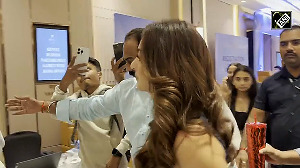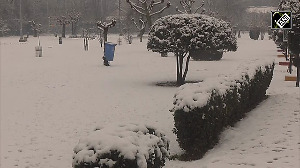With private telecom companies and cable operators keen to get into the business, Aksh Optifibre Managing Director Kailash Choudhari discusses the challenges of the market in the absence of a comprehensive regulation. Excerpts from an interview with Shuchi Bansal:
Why is BSNL offering IPTV and what is the nature of your tie up with the telecom company?
We have a franchise agreement with BSNL to roll out television services. We use its network to put up a television station or a Network Operating Centre (NOC) as it is called. Whatever revenue we collect will be shared with BSNL as per the agreement. The contract with MTNL is similar.
Are you the only franchisee?
No. Seven months ago BSNL appointed Smart Digivision to roll out IPTV in 56 cities. MTNL, too, has two franchisees each in Delhi and Mumbai.
How do you deliver the TV channels to consumer homes?
Through the existing telephone line. There are wires coming to your telephone. What we do is take them out of the phone, and put a splitter. One line goes into the PC modem and the other goes to the set-top box. We don't have to lay any wires. The only thing we put at your end is a wire from your set-top box to your TV.
But you managed to capture only 5,000 MTNL subscribers in Delhi in a year and a
half?
We signed the agreements one and a half years ago. Most of the work has only been done in the last seven months. IPTV is a new technology and we are trying to establish the service and sort out the problems.
What are the problems - cost, technology or awareness?
All three. Initially, the issue was largely technical. The MTNL network had to be groomed to be able to carry the channels. Grooming is like cleaning up the passage for traffic. For instance, if a wire is shoddily twisted, it would block traffic.The bigger challenge, however, is content. Consumers want all the 100 channels that they are used to, in addition to fresh content. Tying up with the TV channels is a big headache. They are either not willing to give content or ask for huge price premiums on their channels.
Why?
If you are a broadcaster, you have to compulsorily give your channels to DTH platforms and cable operators. There's no such regulation for IPTV. So people who are forward - looking say there is no regulation and hence no restriction, let me give the channels to an IPTV platform. Others think that there is no regulation and hope it's not illegal to give content to IPTV. I would say the problem is getting resolved now.
Do you have popular channels in your bouquet?
We have the Star and Zee bouquets among the 150 channels that we offer. But most of them have priced themselves very high unlike, say, in DTH, where what the broadcasters charge per subscriber is fixed by the TRAI. In our case, we are sometimes paying Rs 100 per subscriber.We are requesting the TRAI that since we have a set-top box, are digital and interactive why doesn't it also put us under the same guidelines as CAS.
How is IPTV different from digital cable or DTH?
We are better than them. We have services which are not available on CAS or DTH, like time-shift. In IPTV you can watch your favourite programme even three hours after it has been telecast. You can pause it or rewind it.
This means the programme is recorded.
Yes. But it is not recorded at your end. It is at my end (in a central server). Because IPTV streams, we record it at our end for the whole network.
Isn't that an issue with broadcasters?
Yes. We are requesting the TRAI to sort it out. The world over there is no law which compels a broadcaster to give his channels to a distributor. But it exists in India. So we are unique. We have to address the IPTV problem also in a unique manner.
But there are IPTV guidelines.
What they deal with is stuff on FDI limits, investments and net worth of an IPTV company. We want IPTV to go beyond this discussion. It has to be pushed like a consumer-friendly service.
But IPTV is more expensive than DTH and cable.
Who says that? We are giving the set-top box free. There is a refundable deposit of Rs 999. One year's subscription for TV channels is also free. Yes, we will lose money, but which service has had a cash break after the first year?
If subscription is free, what's you business model?
It's a pull-advertising model. There will be ads but only if you want to see them. We cannot remove ads from the channels that we take from the broadcasters, but our own content will be free of commercials. There'll be a separate channel- a kind of a video information directory.Here you will see the ad of the neighbourhood plumber, or a commercial of a Thai food restaurant in the city. The advertising directory is called A-Tube and you will have to click on it through your remote.
What's the downside of IPTV?
Consumer mindset and lack of awareness and also the fact that the existing players -cable and DTH -will make life very difficult for us. They are very aggressive and create confusion on IPTV, through newspaper articles.
74 per cent FDI is being recommended in IPTV. Will you look for a financial or strategic partner?
Yes we may, since we are looking at rapid growth. I suppose when you say strategic it means technology. But in IPTV, strategic could mean content as well. A content owner would want to own a distribution media.
The size of IPTV market in India in five years?
The IPTV market has about 2 to 3 million subscribers.







 © 2025 Rediff.com -
© 2025 Rediff.com -